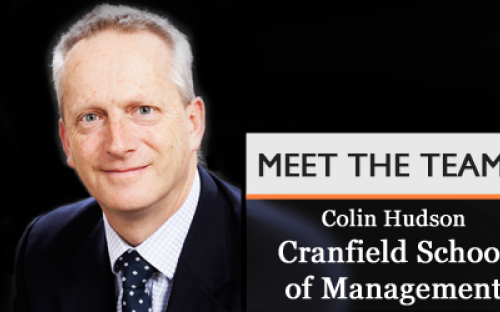What's your role at Cranfield School of Management?
I am Director of Career Development at Cranfield School of Management, responsible for developing the career management skills of all our students and connecting them with the very best opportunities for achieving their career goals.
How big is the Careers team and how do you work with other departments at the school?
With a dedicated team of 10 staff and 6 Associates, we provide a full Career Development service to the School’s Graduate Programmes portfolio. We integrate with other professional departments of the school to support Admissions and Alumni activities. I firmly believe that once you join Cranfield you enter a partnership that will last throughout your career, and we do everything to maintain that relationship.
Beyond this, we are lucky amongst Business Schools in that we are able to integrate some of our Career Development activities with the academic programme, so we are seen as an active and integral part of the School. Finally the School of Management is one part of Cranfield University and we maintain strong links with other Schools for the benefit of all the University.
Give us some examples of MBAs who have gone on to do interesting jobs in the last few years
MBA graduate Himani Gupta is a fine example of the outstanding career transitions achievable with a Cranfield MBA. Last year she accepted a role as BP’s Technology Innovation Manager, and what is particularly impressive about Himani is that in securing this role, she not only changed employment sector and function but also country.
Other names that stand out are Budhi Chilkoti who made an exceptional transition from Ship Captain to Business Development Director at Saint Gobain, and Daniel Sprich who went from IT Director to Project Intelligence Analyst for BP. We are extremely proud of all our students and take great pleasure from watching them graduate and go on to secure these top positions.
Which industries and sectors does Cranfield have the strongest relationships with?
Our tradition of placing students in Consultancy still stands as our strongest sector, with 31% of our most recent graduates gaining post-MBA roles within a consultancy function. We have also seen positive growth in Strategy and General Management as well as renewed activity in the Energy sector.
Do you find it easier to connect with Cranfield students because you're a Cranfield MBA yourself?
I think that having been through the same experiences as the current students and having a passion for the School obviously helps. It certainly means that I can empathise and appreciate the highs and lows of the student year. I honestly think that some of them are surprised to find their Career Development Director has sat in the past where they sit now.
What's changed about the school in the last 20 years?
Technology mostly!! When I was a student, reports and assessments were produced in the computer studio which became a focus for panic and stress as deadlines approached. The interesting things are those that haven’t changed – the School’s commitment to applied learning, the Cranfield three day learning cycle and the location of the campus creating a close knit and committed cohort.
You've had a range of commercial roles in the energy/ utilities sector, what were the highlights of your early career?
Early in my career I was given my first large operational role with direct responsibility for 180 engineers and their support staff. I knew very little technically about their jobs and had to rely for the first time solely on people skills to develop an effective working environment.
At 30 years of age, standing on the soap box to address 180 engineers in Hull as the representative of “management” is a daunting yet exciting memory, and a real highlight of my early career before Cranfield.
You're an experienced executive coach - what would a typical coaching session involve?
Most coaches will tell you that there is no such thing as a typical session! Although there are some fixed boundaries such as location and duration of session, the best sessions often just evolve from having created a suitable environment and by asking the right questions.
At the end of the session you look for the coachee to have taken some learning about themselves from the meeting, and to have something on which to act to improve their personal and business performance. Of course there are also more structured programmes, and these form a framework for sustained development and learning.
Do you have any advice for MBAs entering the global job market in 2012?
‘The best candidates will always get jobs’ is a good starting point, so developing belief in yourself and your skills is vital. Know what you are good at, understand where you might find the opportunity to do it, create a plan and then execute it effectively. There is no substitute for lots of hard work and drive in making things happen in your own career. And, whatever your Business School, use your Careers Team as much as you can, but remember that first and foremost this is your career!
And any advice for people thinking of doing an MBA - why should they choose Cranfield?!
An MBA isn’t for everyone, the time and stage of you career will help you determine if it is right for you, and you should do as much research as possible. Cranfield has a number of areas where it is different from other schools, apart from the obvious focus on being a 12-month full-time programme. We maintain a closeness to industry and application of learning.
For almost 50 years, Cranfield School of Management, a world leader in management education and research, has been helping individuals and businesses learn and succeed by transforming knowledge into action. Our faculty are leaders in their chosen fields and are actively engaged in consultancy and business relevant research and they are committed to presenting and delivering practical research with impact.
Our diverse team-based learning groups mirror business management teams; you do not pick them and they give you the opportunity to work alongside individuals of different nationalities, different personalities, different experience providing you with the know-how, skill set and leadership qualities to be the best you can be within the business and industry. As an example Cranfield School of Management is ranked first (out of 20 non-US business schools) in terms of satisfaction for MBA education and preparedness.
RECAPTHA :
f5
c9
d9
b3







